“What was the point of the whole exercise for you, then, if not a way of stealing something from Alison and me?”
“You can hardly compare the two. I just wanted to confirm my suspicion that you actually found something.”
“And you believe that you’ve confirmed that?”
He shook his head, but it was with amusement, not denial. I said, “Why are you here? Do you think I’m going to publish your crackpot theory as my own? I’m too old to get the Fields Medal, but maybe you think it’s Nobel material.”
“Oh, I don’t think you’re interested in fame. As I said, I think you beat me to the prize a long time ago.”
I rose to my feet abruptly; I could feel myself scowling, my fists tightening. “So what’s the bottom line? You want to press charges against me for the laptop? Go ahead. We can each get a fine in absentia .”
Campbell said, “I want to know exactly what was so important to you that you crossed the Tasman, lied your way into my house, abused my hospitality, and stole my files. I don’t think it was simply curiosity, or jealousy. I think you found something ten years ago, and now you’re afraid my work is going to put it at risk.”
I sat down again. The rush of adrenaline I’d experienced at being cornered had dissipated. I could almost hear Alison whispering in my ear, “Either you kill him, Bruno, or you recruit him.” I had no intention of killing anyone, but I wasn’t yet certain that these were the only two choices.
I said, “And if I tell you to mind your own business?”
He shrugged. “Then I’ll work harder. I know you’ve screwed that laptop, and maybe the other computers in my house, but I’m not so broke that I can’t get a new machine.”
Which would be a hundred times faster. He’d re-run every search, probably with wider parameter ranges. The suitcase nuke from Sparseland that had started this whole mess would detonate again, and for all I knew it could be ten times, a hundred times, more powerful.
I said, “Have you ever wanted to join a secret society?”
Campbell gave an incredulous laugh. “No!”
“Neither did I. Too bad.”
I told him everything. The discovery of the defect. Industrial Algebra’s pursuit of the result. The epiphany in Shanghai. Sam establishing contact. The treaty, the ten quiet years. Then the sudden jolt of his own work, and the still-unfolding consequences.
Campbell was clearly shaken, but despite the fact that I’d confirmed his original suspicion he wasn’t ready to take my word for the whole story.
I knew better than to invite him into my office for a demonstration; faking it there would have been trivial. We walked to the local shopping center, and I handed him two hundred dollars to buy a new notebook. I told him the kind of software he’d need to download, without limiting his choice to any particular package. Then I gave him some further instructions. Within half an hour, he had seen the defect for himself, and nudged the border a short distance in each direction.
We were sitting in the food hall, surrounded by boisterous teenagers who’d just got out from school. Campbell was looking at me as if I’d seized a toy machine gun from his hands, transformed it into solid metal, then bashed him over the head with it.
I said, “Cheer up. There was no war of the worlds after Shanghai; I think we’re going to survive this, too.” After all these years, the chance to share the burden with someone new was actually making me feel much more optimistic.
“The defect is dynamic ,” he muttered. “That changes everything.”
“You don’t say.”
Campbell scowled. “I don’t just mean the politics, the dangers. I’m talking about the underlying physical model.”
“Yeah?” I hadn’t come close to examining that issue seriously; it had been enough of a struggle coming to terms with his original calculations.
“All along, I’ve assumed that there were exact symmetries in the Planck scale physics that accounted for a stable boundary between macroscopic arithmetics. It was an artificial restriction, but I took it for granted, because anything else seemed…”
“Unbelievable?”
“Yes.” He blinked and looked away, surveying the crowd of diners as if he had no idea how he’d ended up among them. “I’m flying back in a few hours.”
“Does Bridget know why you came?”
“Not exactly.”
I said, “No one else can know what I’ve told you. Not yet. The risks are too great, everything’s too fluid.”
“Yeah.” He met my gaze. He wasn’t just humoring me; he understood what people like IA might do.
“In the long term,” I said, “we’re going to have to find a way to make this safe. To make everyone safe.” I’d never quite articulated that goal before, but I was only just beginning to absorb the ramifications of Campbell’s insights.
“How?” he wondered. “Do we want to build a wall, or do we want to tear one down?”
“I don’t know. The first thing we need is a better map, a better feel for the whole territory.”
He’d hired a car at the airport in order to drive here and confront me; it was parked in a side street close to my house. I walked him to it.
We shook hands before parting. I said, “Welcome to the reluctant cabal.”
Campbell winced. “Let’s find a way to change it from reluctant to redundant.”
* * *
In the weeks that followed, Campbell worked on refinements to his theory, emailing Alison and me every few days. Alison had taken my unilateral decision to recruit Campbell with much more equanimity than I’d expected. “Better to have him inside the tent,” was all she’d said.
This proved to be an understatement. While the two of us soon caught up with him on all the technicalities, it was clear that his intuition on the subject, hard-won over many years of trial and error, was the key to his spectacular progress now. Merely stealing his notes and his algorithms would never have brought us so far.
Gradually, the dynamic version of the theory took shape. As far as macroscopic objects were concerned—and in this context, “macroscopic” stretched all the way down to the quantum states of subatomic particles—all traces of Platonic mathematics were banished. A “proof” concerning the integers was just a class of physical processes, and the result of that proof was neither read from, nor written to, any universal book of truths. Rather, the agreement between proofs was simply a strong, but imperfect, correlation between the different processes that counted as proofs of the same thing. Those correlations arose from the way that the primordial states of Planck-scale physics were carved up—imperfectly—into subsystems that appeared to be distinct objects.
The truths of mathematics appeared to be enduring and universal because they persisted with great efficiency within the states of matter and space-time. But there was a built-in flaw in the whole idealization of distinct objects, and the point where the concept finally cracked open was the defect Alison and I had found in our volunteers’ data, which appeared to any macroscopic test as the border between contradictory mathematical systems.
We’d derived a crude empirical rule which said that the border shifted when a proposition’s neighbors outvoted it. If you managed to prove that x+1=y+1 and x-1=y-1, then x=y became a sitting duck, even if it hadn’t been true before. The consequences of Campbell’s search had shown that the reality was more complex, and in his new model, the old border rule became an approximation for a more subtle process, anchored in the dynamics of primordial states that knew nothing of the arithmetic of electrons and apples. The near-side arithmetic Campbell had blasted into the far side hadn’t got there by besieging the target with syllogisms; it had got there because he’d gone straight for a far deeper failure in the whole idea of “integers” than Alison and I had ever dreamed of.
Читать дальше

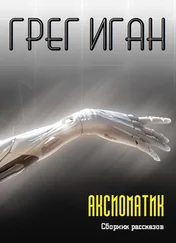
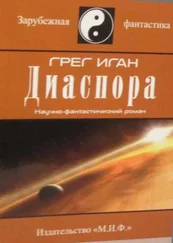
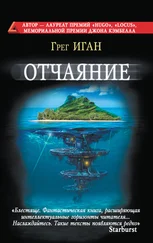
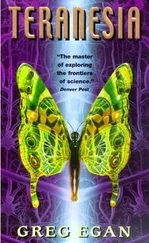
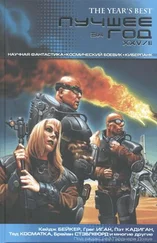


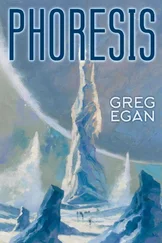
![Грег Иган - Рассказы [компиляция]](/books/419837/greg-igan-rasskazy-kompilyaciya-thumb.webp)
